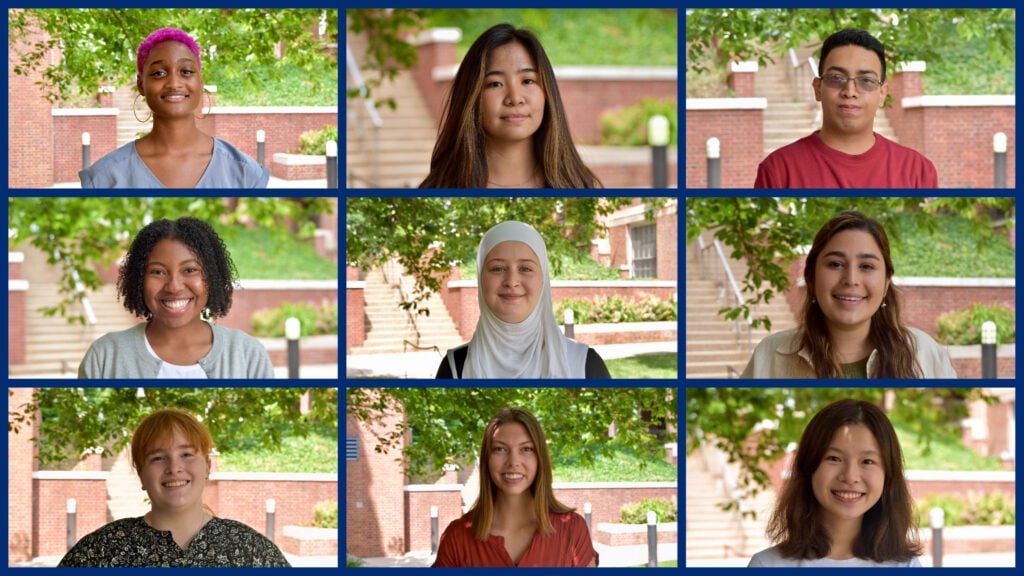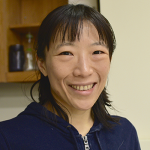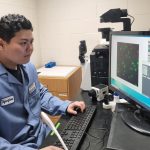Meet our Summer 2022 Undergraduate Student Researchers

Above photo. Top row from left to right: Alexandra Wright, Andrea Kian, and Angel Garcia-Ramirez. Middle row from left to right: Ayanna Horsford, Dana Allabadibi, and Gabriela Bentolila. Bottom row from left to right: Nyssa Engebo, Peyton Panovich, and Christine Wei.
Every summer for 12 years, the INBT welcomes undergraduate students in the Nanotechnology for Biology and Bioengineering Research Experience for Undergraduates (REU) program. Students spend 10-weeks with INBT faculty and mentors heavily engaged in research projects ranging from developing cancer therapies and diagnostic tools to using regenerative engineering to heal the body. They also participate in professional development training, networking activities, and explore Baltimore and other surrounding cities.
Meet our student researchers, learn about their projects, and follow them on social media.
Home University: Mary Baldwin University
INBT Faculty Mentor: Luo Gu
INBT Graduate Student Mentor: Yi Zuo
Research Project: I am exploring the usage of rare Earth elements to improve the mechanical properties of hydrogels.
Social media: Follow Wright on LinkedIn and Facebook.
“I am incredibly excited and grateful for the opportunity to be an INBT summer researcher,” said Wright.
Home University: University of Virginia
INBT Faculty Mentor: Xiaobo Mao
INBT Graduate Student Mentor: Shuya Li
Research Project: Parkinson’s disease is caused by an aggregation of alpha-synuclein, which deteriorates and kills brain neurons. A connection between these misfolded proteins traveling from the gut to the brain via the vagus nerve was discovered, however, the method of travel is unknown. I am investigating the potential role that neutrophils play in carrying alpha-synuclein through the vagus nerve. Understanding this process would allow for the creation of better therapeutics and treatments for Parkinson’s disease.
Social media: Follow Kian on LinkedIn.
“Studying and working at Johns Hopkins has always been a dream of mine. I’m beyond grateful to be able to conduct innovative and life-changing research under the supervision and guidance of Dr. Xiaobo Mao and Dr. Shuya Li. This summer, I look forward to expanding my research skills and getting to know my fellow peers in the INBT program, while also getting to know the city of Baltimore more,” said Kian.
Home University: Carleton College
INBT Faculty Mentor: Honggang Cui
INBT Graduate Student Mentor: Boran Sun
Research Project: I am working on developing an effective drug-peptide amphiphile to treat patients resistant to anti-hypertensive medication. This co-assembly would allow for prolonged-release and maximize the drug load. Present-day drugs aren’t very effective against obesity-induced hypertension, but this approach would provide a means to combat that issue.
Social media: Follow Garcia-Ramirez on LinkedIn.
“Participating in research that may one day benefit people is nothing short of a privilege that the John Hopkins REU program has provided me,” said Noe Garcia-Ramirez.
Home University: Manhattan College
INBT Faculty Mentor: Denis Wirtz and Jude Philip
INBT Graduate Student Mentor: Ladaisha Thompson and Pratik Kamat
Research Project: I am investigating how senescence changes the motility of fibroblast cells during aging. I am using confocal microscopy to assess the difference in motility as a function of age. This will help us understand different cellular phenotypes of aging.
Social media: Follow Horsford on LinkedIn.
“In my perspective, research is such an innovative and lucrative approach to science. I look forward to strengthening my skills, advancing my scientific approach, networking, and learning from exceptional faculty members and mentors,” said Horsford.
Home University: University of California, Irvine
INBT Faculty Mentor: Hai-Quan Mao
INBT Graduate Student Mentor: Yining Zhu
Research Project: I am working on screening and validating lipid nanoparticle (LNP) formulations for the development of an mRNA vaccine against melanoma as well as elucidating the mechanism responsible for the best performing LNP formulation’s enhanced tumor inhibition and survival outcomes in mouse models. This work will present a highly innovative and promising alternative to conventional cancer therapies and provide deeper insights into anti-tumor immune response.
Social media: Follow Wei on LinkedIn.
“Thank you so much to the NanoBio REU program and Dr. Hai-Quan Mao for providing me the opportunity to work on a cutting-edge research project at Johns Hopkins this summer! I am very excited to explore the field of therapeutic delivery more in depth, meet new people, and hone my research skills during the program,” said Wei.
Home University: University of Rhode Island
INBT Faculty Mentor: Stavroula Sofou
INBT Graduate Student Mentor: Pooja Hariharan
Research Project: Developing models of how drugs move through 231 spheroids to better understand the path and influence of drugs within the body.
Social media: Follow Allababidi on LinkedIn.
“Being a part of the INBT program has been a great privilege to gain research and life skills that will shape my future as a scientist,” said Allababidi.
Home University: Columbia University
INBT Faculty Mentor: Robert Ivkov
INBT Graduate Student Mentor: Hayden Carlton
Research Project: I am helping to develop a theragnostic treatment protocol that combines magnetic particle imaging and magnetic particle hyperthermia for cancer therapy. Specifically, I am working on identifying particles that have high theragnostic efficacy by exhibiting both high thermal output and high resolution imagery, as well as assessing antibody functionalized particles for improved treatment.
Social media: Follow Bentolila on LinkedIn.
“I am so grateful to have been accepted into the Institute for NanoBioTechnology’s REU program and to have the opportunity to learn from my mentor, Dr. Hayden Carlton and PI Dr. Robert Ivkov,” said Bentolila.
Home University: Oregon State University
INBT Faculty Mentor: Stavroula Sofou
INBT Graduate Student Mentor: Pooja Hariharan
Research Project: Developing models of how drugs move through 231 spheroids to better understand the path and influence of drugs within the body.
Social media: Follow Engebo on LinkedIn.
“I am incredibly grateful for this opportunity and being able to spend my summer at Johns Hopkins learning more about engineering and why I entered this field,” said Engebo.
Home University: University of Kansas
INBT Faculty Mentor: Sangmoo Jeong
INBT Graduate Student Mentor: Alli Abolarin
Research Project: We are trying to better understand the metabolic behavior of acute myeloid leukemia (AML) cells. This information will hopefully lead to future therapeutic developments for the treatment of AML.
Social media: Follow Panovich on LinkedIn.
“I’m incredibly grateful to be a part of the INBT REU program this summer. I am looking forward to gaining more experience in the field of scientific research and making new connections,” said Panovich.





